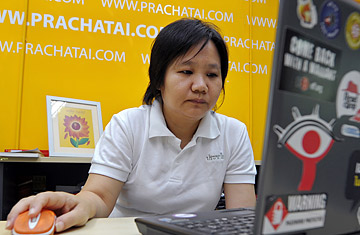
Chiranuch Premchaiporn, at her office in Bangkok on Nov. 5, 2010, is charged in connection with 10 allegedly antimonarchy comments that others posted on her Thai news website, Prachatai
With its notorious red-light districts and high per capita murder rate, Thailand is home to plenty of shocking court dramas. But the case of Chiranuch Premchaiporn now unfolding in a Bangkok courtroom is raising eyebrows not so much because of the alleged misdeeds — 10 violations of the Computer Crime Act — but because it serves as a crucial test of freedom of expression in this politically troubled country.
The 32-year-old webmaster of a popular Thai news website, Prachatai, Chiranuch saw her troubles start in 2009 when she was charged in connection with 10 allegedly antimonarchy comments posted on a Prachatai Web board. None of the posts were Chiranuch's own. She removed the controversial comments when officials from Thailand's Ministry of Information and Communication Technology complained. In July 2010, Prachatai shut down the comment forums altogether.
Nonetheless, Chiranuch is being prosecuted under the Computer Crime Act. The law was one of the first pieces of legislation passed by a now disbanded military-backed government that took over after a coup in 2006. It was ostensibly set up to combat hackers and other online miscreants, but also contains provisions allowing prosecution of those who create or spread online material that could be used to undermine national security or induce public panic.
Critics contend that the vagueness of these provisions, particularly the definition of national security, makes the law subject to political abuse. Indeed, studies by local university researchers have found that the bulk of people so far charged under the Computer Crime Act fall afoul of national-security concerns, not any hacking infractions.
Over the past few years, as Thailand has endured a revolving door of governments from two diametrically opposed political camps, the country's media environment has suffered. In an international press-freedom index of 178 nations compiled by media watchdog Reporters Without Borders, Thailand scored a lowly 153rd place last year. It was 65th in 2002.
Media and online censorship has continued during the tenure of Prime Minister Abhisit Vejjajiva, who enacted a months-long state of emergency during Thailand's prolonged antigovernment protests last year. Hundreds of websites have been shuttered, including various versions of Prachatai's site. Some banned sites had openly called for Abhisit's government to step down, especially after protesters in Bangkok clashed with security forces last April and May, resulting in some 90 deaths.
Other blocked websites contained language that could be seen as criticizing Thailand's royal family. A Thai legal-research entity called the iLaw Project says that in 2010 the Thai government tried to block or close down 38,868 websites and Web pages for purported antiroyal material.
A constitutional monarchy, Thailand is home to the world's longest-serving monarch, King Bhumibol Adulyadej. Now 83 years old and hospitalized, the Thai monarch is venerated across the country. He and his family are well protected by lèse-majesté laws that can put offenders behind bars for up to 15 years.
The number of these lèse-majesté complaints, which can be filed by anyone, not just the police or legal authorities, has grown steadily along with the political unrest in the country. David Streckfuss, an American academic who recently wrote a book on Thai lèse-majesté law, reports that there were 164 such cases that went to trial in the Court of First Instance in 2009, compared with just a handful two decades ago.
Chiranuch has been accused of violating the lèse-majesté laws in addition to the Computer Crime Act. Last November, upon returning from a conference on Internet freedom in Hungary, she was arrested based on a complaint filed by a resident of northeastern Thailand, who was apparently upset by the postings on Prachatai. It took the police more than a year after receiving his complaint to arrest her. These additional charges could add 32 years to the 50 years in prison Chiranuch faces if convicted for all the alleged computer violations.
Back in September 2009, Prime Minister Abhisit conceded in a TIME interview that some flaws in the "enforcement and operating procedures" of lèse-majesté cases existed and promised that a Justice Ministry review board would clear up the process. "The basic problem right now," he told TIME, "is that anyone can file a case." But as yet, there has been no significant change in the lèse-majesté procedures.
If Chiranuch does end up in prison, it will undoubtedly cause an outcry among freedom-of-expression advocates worldwide. "The judicial system will be completely discredited if all the charges against her are not dropped," says a statement from Reporters Without Borders. "She is being treated like a criminal although she is regarded internationally as an expert in online journalism." Unfortunately, global outrage may not be much help to Chiranuch as Thailand's high-stakes courtroom drama continues.
